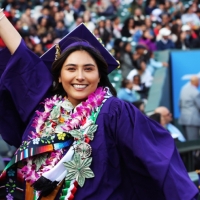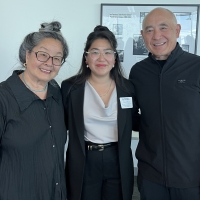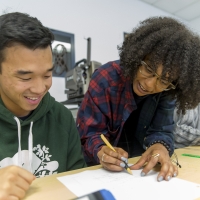by Jamie Oppenheim
San Francisco State University’s Queer Cinema Project (QCP), a program that encourages the production, study, and promotion of queer cinema, has received a generous $25,000 grant from the Jonathan Logan Family Foundation, a philanthropic organization that advances social justice by supporting works in journalism, the arts, the environment, documentary film and more.
The Jonathan Logan Family Foundation has also offered an additional $25,000 match grant to QCP, challenging QCP to raise $25,000 by June 2021 in order to receive another $25,000 from the Logan Foundation, for a potential total of $50,000. The Logan Foundation's funds will strengthen QCP’s mentorship program, according to one of the program’s founders, Assistant Professor of Cinema Johnny Symons.
QCP, one of the only programs of its kind at an academic institution, was launched about three years ago. Since then, students have produced more than 30 LGBTQ-themed films, Symons said. Many of those films have gone on to show in festivals and win awards. In the past three years, students who made films dealing with queer themes won awards from the prestigious Princess Grace Foundation, which provides substantial funding that allows students to complete their films.
“There are a ton of LGBTQ students who have been coming to the School of Cinema because of our excellent program,” Symons said. “San Francisco and the Bay Area are also magnets for LGBTQ rights, activism, and filmmaking. What we can do as a program is help them learn the skills needed to be successful in filmmaking and help them create projects that will leverage them to that next level. There’s so much raw talent from the LGBTQ community, and we wanted a program that would shape it.”
The grant will institutionalize a system through which LGBTQ students can be mentored by queer professors, not only in the School of Cinema but in the University at large, said Sam Davis-Boyd, an MFA cinema student who has been interning for QCP and conducted research for the grant proposal.
“We’re hoping to connect emerging student filmmakers with other queer filmmakers on campus or other queer faculty on campus,” she said. “For example, if a student was working on a film that had a big historical presence or was about math, we’d be able to go to those other departments and connect them with queer faculty members.”
Faculty from other departments could help flesh out ideas or give them ideas on sourcing, Symons adds.
Being able to connect with other queer faculty in the School of Cinema has been meaningful, Davis-Boyd says. “For me, it’s important to have other established queer filmmakers give me feedback and talk through my projects,” she said.
Other features of the mentorship program will be connecting LGBTQ cinema students to one another and developing an online platform where LGBTQ films are available to external organizations, the public, and festivals.
“The goal for these films isn’t just to complete coursework, but to actually make a splash in the world and change hearts and minds around LGBTQ issues and get students to the next stage of their careers,” Symons added.




